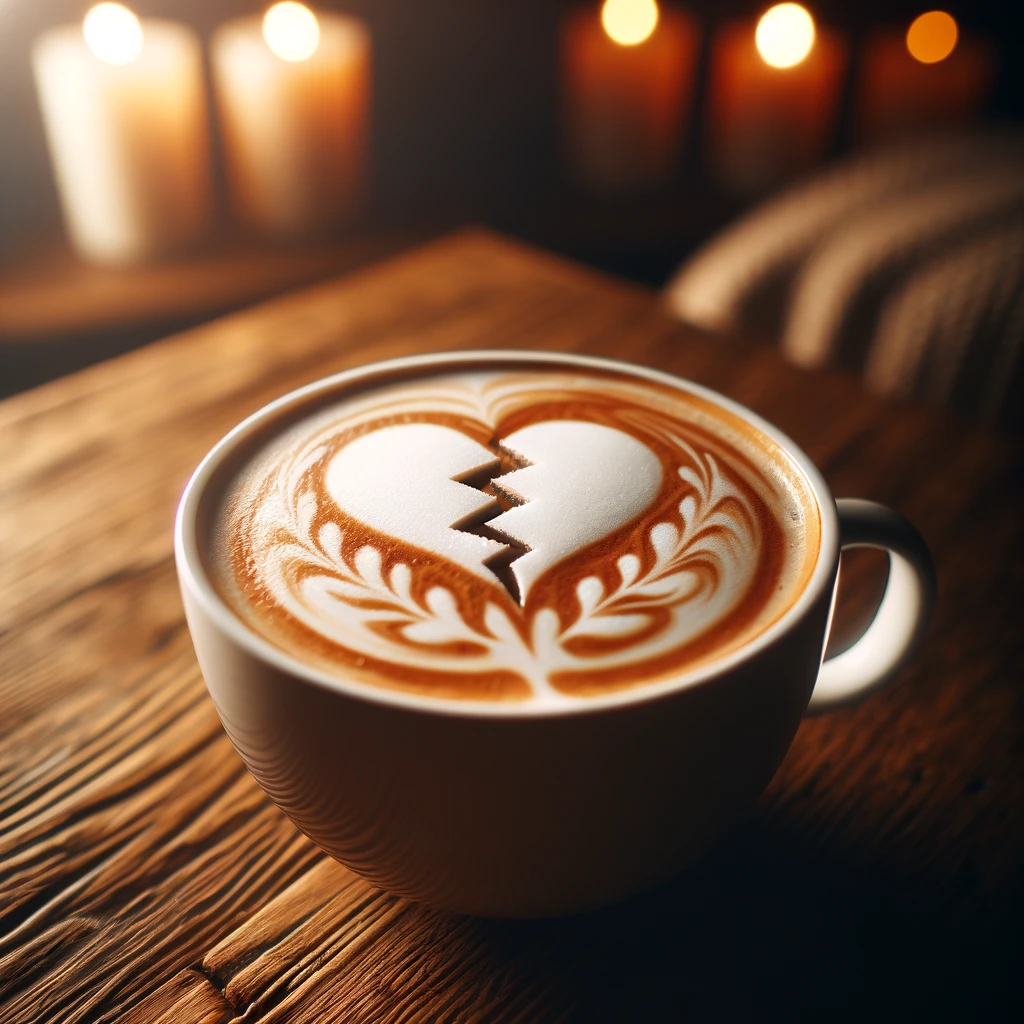How often have you met up with a friend at a cafe to catch up over creamy tea lattes? Or sat in the break room with your coworkers, brooding over the impossible deadline of a project while gulping down your 3rd or 4th cup of coffee trying to find the energy to deal with the stress. Only to get home later that night and find yourself tossing and turning in your bed, unable to get comfortable or feel peaceful. Suddenly, all the energy you needed earlier is now thrusted into your brain, making you hypersensitive to any bit of light or noise, and playing decades-old memories around shame and guilt. After 4 or 5 hours of on-and-off-again sleep, you drag yourself out of bed without the energy to go about your day as normal, so that process of drinking caffeine begins again.
This is the vicious cycle of caffeine dependence. Caffeine is in coffee, various teas like chai, matcha and kombucha, chocolate, and artificially added to energy drinks. Cafes, from coffee stands to dessert shops and boba shops, sometimes line the same city block, leaving us seemingly endless options to acquiring this addictive stimulant. Quitting caffeine and restoring the body's natural ability to create sustainable energy can seem like a daunting task. We'll expand on the caffeine dependency, why stimulants like coffee or tea become a coping mechanism, and what alternatives to coffee and caffeine look like.

Caffeine Intake and the Cycle of Fatigue
We'll say it plain and simple: Caffeine is a drug. In the world of health, there are no quick fixes that don’t also have consequences on your body.
Many people are drawn to coffee and caffeinated beverages because it is believed that caffeine “gives them energy.” The truth is that caffeine masks sleepiness by blocking the receptors for adenosine, a chemical related to tiredness. (1, 2) This creates the perception that you have more energy. Adenosine is produced as a natural byproduct of energy being used. Hence, being tired after a long day of activity.
Like drugs, caffeine has a comedown. While the caffeine sits on adenosine receptors, adenosine concentrates. After the caffeine breaks down, adenosine floods its receptors, creating a feeling of sleepiness. Depending on how frequently the caffeine was used or the dosage consumed, this wave of sleepiness can be intense.
Essentially, you create an energy debt by using caffeine to thwart adenosine, and this energy debt can only be solved by getting good sleep.

Health Implications of Chronic Caffeine Consumption
Caffeine is a natural stimulant in coffee, tea, and cacao plants. Caffeine is also added to many sodas, energy drinks, and over-the-counter medications. It works by stimulating the brain and central nervous system, helping to stay alert and prevent the onset of tiredness.
Regular, heavy consumption of caffeine can lead to several long-term issues. Understanding these potential risks is important to make informed decisions about caffeine intake.
Caffeine can interfere with normal sleep patterns, leading to insomnia or poor-quality sleep over time due to overstimulation of the nervous system. This is a catch-22 since poor sleep quality creates the desire to consume more caffeine.
Coffee drinkers are also shown to have higher baseline stress hormone levels compared to non-coffee drinkers, with a strong correlation to anxiety in males. (3)
Excessive caffeine consumption may also contribute to heart palpitations, increased blood pressure, and other cardiovascular issues. With this long list of ill effects, the need to decrease caffeine intake and consider the use of healthy coffee alternatives is warranted. For more information on the detrimental effects of coffee, read this article: The Link Between Caffeine and Anxiety.

Plan to Decrease or Eliminate Caffeine Intake
Regular caffeine use can lead to physical dependence. Abruptly stopping caffeine can lead to withdrawal symptoms like headaches, fatigue, irritability, and low mood. Gradually reducing your intake can minimize these effects.
- Start by mixing regular coffee with decaffeinated coffee, gradually increasing the proportion of decaf.
- Choose smaller servings or weaker brews. Light roast coffee has the most caffeine, whereas dark roast coffee has less.
- Stay hydrated to help flush out caffeine and minimize withdrawal symptoms.
- Incorporate caffeine-free herbal teas, water with electrolytes, and coffee alternatives into your routine

Alternatives to Coffee
Coffee alternatives and the transition to reducing caffeine overall can help enhance sleep quality, reduce anxiety, and decrease other health risks associated with high caffeine intake. Let's delve deeper into these options:
- Herbal Teas: Many companies offer a wide range of herbal teas, such as chamomile, peppermint, and rooibos, known for their caffeine-free, calming properties. These teas have been a staple in traditional medicine and are now being embraced for their health benefits and natural flavors.
- Dandelion Tea: There are a few brands on the market that utilize a blend of dandelion, chicory, carob, dates, figs, and other tea leaves and dried fruit mixes that mimic the bold, bitter flavors, and slightly sweet notes of coffee which are completely caffeine-free.
- Decaffeinated Coffee: Several decaf coffee brands may still contain caffeine, just at a reduced dosage. As a transition, you can mix half of your regular coffee with decaf, until you are not as dependent on caffeine. The idea is to taper off of coffee fully however.
- Cacao Beverages: There is a growing interest in cacao-based drinks as coffee alternatives. While cacao has a lower caffeine content to coffee, these types of drinks should still be consumed sparingly and not as a morning ritual to wake up and focus.
- Unique Alternatives: For those seeking a departure from traditional beverages, hot bone broth in the mornings can provide essential amino acids and electrolytes, while freshly squeezed orange juice offers a refreshing start with natural sugars and vitamins.
Coffee alternatives like chocolate drinks or chai, while containing less caffeine than traditional coffee, can still lead to dependencies due to their caffeine content and the habitual nature of consumption. Caffeine consumption, even in small doses, can lead to physical dependence over time, resulting in withdrawal symptoms like headaches, fatigue, and irritability when consumption is reduced or stopped.
Moreover, the ritualistic aspect of consuming these beverages, often associated with relaxation or a break in the day, can contribute to a psychological dependency and the abuse of caffeine as a coping mechanism. The comforting routine of sipping a warm chai or enjoying a chocolate drink can become a hard-to-break habit, leading individuals to feel they need these drinks to start their day or to provide a mental boost. This combination of low-level physical dependence and psychological comfort can make it challenging to break the cycle of habitual consumption, similar to the dependencies formed with higher-caffeine products like coffee.
Matcha Green Tea
Many people tout matcha green tea as a healthier alternative to coffee, but does your matcha latte actually have less caffeine? Actually, matcha powder can contain even more caffeine than regular coffee. Despite its high antioxidant content and the presence of L-Theanine, which can promote relaxation, the primary concern remains the total caffeine content. Although released more slowly, the caffeine in a matcha latte still contributes to the cumulative caffeine intake, which we aim to reduce or eliminate for better health.
This slow release, while avoiding the abrupt spike and crash typical of coffee, does not mitigate the long-term effects of caffeine on the body. Prolonged exposure to caffeine, regardless of the source, can harm sleep quality and overall health. Therefore, while a matcha latte may have certain beneficial properties, it is not the optimal choice for those seeking to decrease caffeine or eliminate caffeine from their diet completely.

The Most Potent Recipe for Energy
Unsurprisingly, the most potent recipe for consistent energy is deep, restorative sleep. While you sleep, the accumulated adenosine in the brain is gradually broken down. This process is one of the reasons why sleep is restorative, and you wake up feeling refreshed. The reduction of adenosine levels during sleep decreases fatigue, making you feel more alert and energized upon waking.
As explained earlier, caffeine sits on the adenosine receptors, causing excess adenosine to build up. This means you’re dealing with more fatigue and, potentially, needing more sleep to clear the excess adenosine. As you decrease your caffeine intake, sleepiness should develop appropriately in the evenings but be sufficiently cleared upon waking. (4)
For more information on getting restorative sleep on a consistent basis, I recommend referencing the following article: Solving the Insomnia Puzzle: Restful Sleep through Functional Patterns.
Conclusion
While caffeine can provide a temporary boost, its excessive intake poses several health risks. Exploring coffee alternatives opens up a world of flavors and health benefits. These alternatives cater to diverse preferences and health requirements, making them an excellent choice for reducing caffeine intake. By adopting these alternatives, along with a healthy sleep routine, one can achieve a more balanced and energetic lifestyle.
References
- Adenosine, Adenosine Receptors and the Actions of Caffeine * - Fredholm - 1995 - Pharmacology & Toxicology - Wiley Online Library
- How Does Caffeine Give Us Energy? | Friedman School of Nutrition Science and Policy (tufts.edu)
- Habitual coffee drinkers display a distinct pattern of brain functional connectivity | Molecular Psychiatry (nature.com)
- https://www.sleepfoundation.org/nutrition/caffeine-and-sleep







